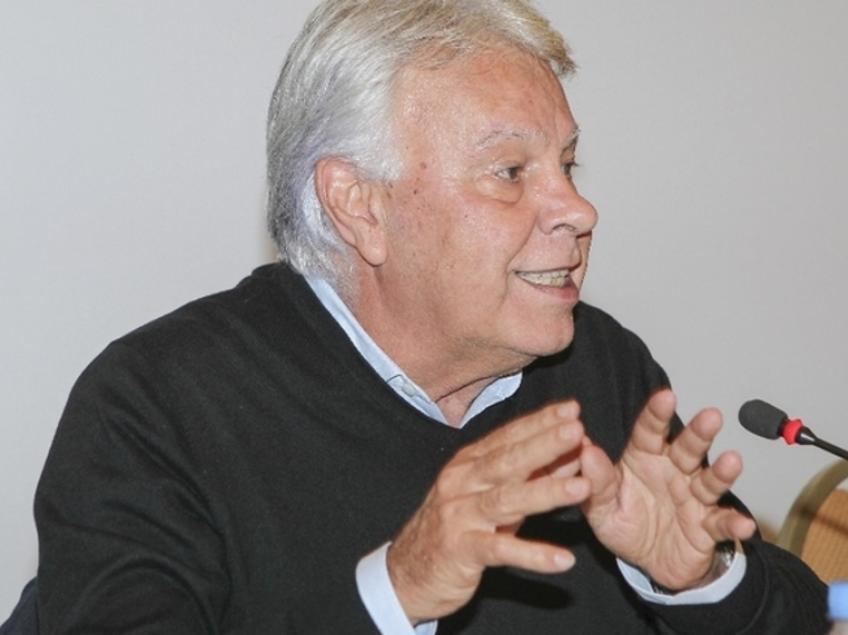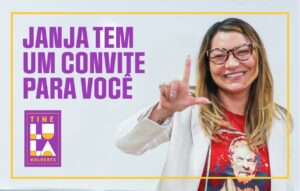On Monday (July 22), the Lula Institute hosted a conference titled “The New Challenges of Democracy”, featuring a discussion with the former president of the Government of Spain, Felipe González.Also attending the event, sponsored in partnership with the Friedrich Ebert and Perseu Abramo Foundations, was former President Luiz Inacio Lula da Silva.
At the table were Directors of the Lula Institute Clara Ant and Paul Okamotto, Thomas Manz, of the Friedrich Ebert Foundation, and Kjeld Jakobsen, director of Perseu Abramo Foundation.In his initial presentation, Manz made reference to the protests experienced by several countries, including Brazil:”Indignation and protest waves are a reaction to the market’s threats to democracy,” he said. Jakobsen, evoking the subject of the discussion by former President González, defined democracy as “the solitary exercise of thinking about what is the best for the greatest number of people.”
Okamotto, the President of the Lula Institute, said the “question of democracy has become even more complicated today,” especially with the existence of social networks “where there are many opinions, but most are very superficial.”Then former President González began his talk by saying that “he believes in dialogue.”
“There is only one possible way to discover both our differences and our convergences: to attempt to understand the achievements of the other,” he added.He said he had “more questions than answers,” but it is “more important to have a good question,” “because it generates a good debate.”According to him, the crisis that democracy has faced in recent years” has deep roots.”
To understand the present it is necessary to understand globalization, which “changed the notion of territory and citizenship throughout the world, and is a phenomenon from which there is no return”.”For the first time you can have real-time communication,” he noted, and this has helped to “universalize social, economic and political phenomena for which we have no ready answer. “One consequence of these changes, he said, is that the “global economy” became ‘financialized’ and became detached from the real economy.”This produces inequality in the distribution of income, even as it decreases poverty and marginalization in real terms.
“The economy of globalization gives priority to financial flows and has distributed income poorly, both during periods of growth as well as when there is a contraction,” he added.”I never accepted and will never accept a market society in which the human being, the citizen, has become a commodity,” said González.
Another change in the last decade was “the integration of marginal communities and the elimination of poverty, generating new and exciting phenomena of citizenship.”For González, a good example of action can be found in Brazil, “to solve the challenge of democracy countries need to do as Lula did, create a national project that includes everyone,” said the former president of Spain.
Speaking specifically about Europe, he said that “migration is essential for the survival” of the continent, despite the growing xenophobia in many countries.Calling the austerity measures adopted by local governments “austericide”, he said: “After five years, they do not recognize that this policy is wrong.”
While highlighting the various problems faced by Europe and the world, González noted that “nothing has been invented yet to replace representative democracy.”He suggested that improvements could come from improved governance.”Governments need to be more predictable in their decision-making. In addition, they must be efficient and transparent.”And as to the ability to adapt to the political, economic and social challenges of global integration?”To be part of the global economy, it is necessary to be competitive, with high productivity and good technological resources”.
“But,” he said, “that does not mean forgetting the dignity of work and wages.””In Spain, everything we did [with the austerity measures] reduced employment and lowered wages,” he said.”We must improve productivity and human capital. We can only redistribute income if we have an economic surplus. If our ability to produce declines then our ability to distribute income also falls,” diagnosed the former president.This will occur only by investing in education.”The more education people have, the easier it will be to increase their productivity and the competitiveness of the system. It is no longer about physical effort. We are a knowledge society.”




